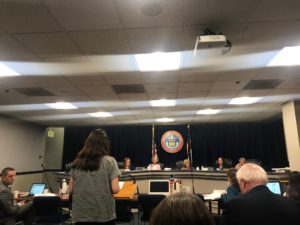By Guest Blogger: Jasmine Kabiri
Good morning, my name is Jasmine Kabiri, and I’m a junior at Silver Creek High School in Longmont. I am also a member of the Colorado Youth Congress, which is an organization of young people taking action on issues we care about. Today I’d like to talk with you about the importance of sharing student and school performance data with families, students, and overall school communities.
Student and school performance data display information on how students are doing academically and if what they are being taught is being put to use. It also shows how effective schools are in educating their  students. I believe it is essential for the Colorado Department of Education to share this performance data with communities because it indicates whether or not students are given full opportunities to learn. Not sharing performance data causes families to be uninformed about the type of learning environment that their student is in. However, when this information is shared with students and families, it allows them to understand what needs to be improved and how they can work towards that.
students. I believe it is essential for the Colorado Department of Education to share this performance data with communities because it indicates whether or not students are given full opportunities to learn. Not sharing performance data causes families to be uninformed about the type of learning environment that their student is in. However, when this information is shared with students and families, it allows them to understand what needs to be improved and how they can work towards that.
As a student, I would want to know if my school is performing strongly or not so I could understand the setting I’m in and if I’d want to change that to a different setting that would benefit me more. In a different situation, if I was shown the performance data of my school that needed to be improved, I could help motivate my school towards advancing themselves. On another note, in the time that I have been in school, my family and I have not been informed of how my school’s have been performing. This shows that the Colorado Department of Education needs to work towards thoroughly notifying students and families about their school’s data. To clarify, this means to ensure that families understand that this data is there and available for them to see.
To conclude, if the Colorado Department of Education becomes more open with and shares student and school performance data, then school communities can know what they need to do to improve their student’s education and chances of success. It is important that we continue to develop the education system and one way we can do that is by providing data that will allow us to improve the performance of our schools and students. We have the right to know how our students and schools are performing so that if we need to, we can fix it.
On August 15th, 2018, I addressed the Colorado Board of Education with the above testimony to state the importance of sharing student and school performance data with students, families, and school communities. The Colorado Board of Education has monthly meetings, open for the public to attend or speak, to discuss topics relating to our local education system. When it was time for public comment, after a fellow Colorado Youth Congress student had stated his personal opinion on the topic, it was then my turn. While the room did not consist of many people, all the eyes of the State Board were on me. For a very short minute and a half, I squeezed in the reasons why sharing school and student performance data is so important and provided a personal explanation of how it has directly impacted me. Now, the State Board has the power to make choices about my education that can either help or hurt myself, my family, my classmates or even my teachers. I knew that with the short amount of time I was given, I needed to make my statement clear and demanding.
Throughout my response, I support why school and student performance data should be shared with school communities. Performance data show how students and schools are progressing and by receiving this information, we can see what needs to to be changed if there is anything that needs improving. Like I mentioned in my testimony, performance data can display if our schools are effectively educating our students. So, if we were to come across information that showed negative data on our students or schools, it’d allow us to be aware of the situation and fix what is needed. However, without this transparency, we won’t know what we might be failing at, and we won’t know if our students are receiving a full and proper education.
As a junior in high school, it was just a bit nerve-racking to speak in front of these seven, very powerful people in my community. I could tell I was speaking too fast and was stuttering, but I would like to think that my message got across to them. Addressing the State Board was a wonderful opportunity and I’m glad to have been able to share what I did.
Afterwards, it was a great experience to speak to a reporter, and others involved in this effort to receive the data around student and school performance. The next day after our testimony, the state released more data than it had in years. It was exciting to be a part of this effort to get more available data on our schools and districts. However, this is not the full picture, and many people are still currently working to get the entire performance data. I’m paying attention – and ready to use my voice again to advocate for our right to know.